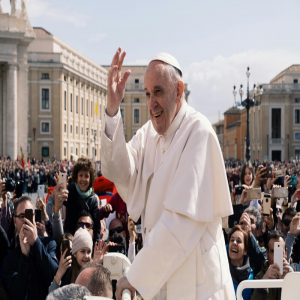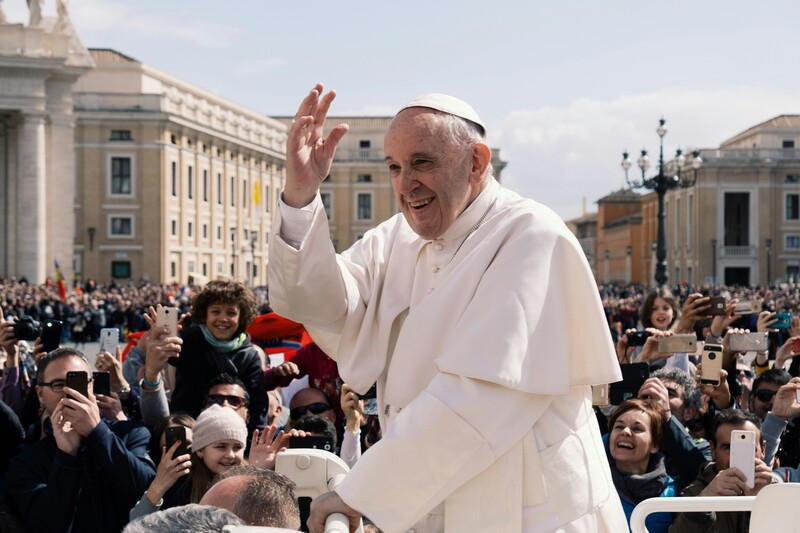
.png) Jacob Peenikaparambil
Jacob Peenikaparambil

With a passion for promoting harmony among the followers of different faiths, 87-year-old Pope Francis embarked on a 12-day tour across four countries, including Indonesia, Papua New Guinea, Timor-Lest and Singapore, on September 2, 2024. Ever since he was elected in 2013 as the leader of two of 1.3 billion Catholics, his top two priorities have been boosting interfaith harmony and caring for and protecting the environment. He firmly believes that these two issues are closely related to peacebuilding, which is an integral dimension of his mission as the leader of the Roman Catholic Church.
Indonesia was the first country that Pope Francis visited during his latest voyage. The visit was marked by many high-profile meetings, including his meeting with Nasaruddin Umar, the grand imam of Jakarta's Istiqlal State Mosque. During this visit, Pope Francis and the grand imam signed a joint declaration calling for interfaith friendship, taking a stand against religious violence, and urging unified action to protect the planet. Opening his speech at the mosque, Francis emphasised the commonality of religions, stating that "by looking deeply … we discover that we are all brothers, all pilgrims, all on our way to God, beyond what differentiates us." He warned against the weaponisation of religion to stoke conflicts and also raised the environmental crisis as an existential threat to human civilisation.
Notably, Pope Francis was welcomed to the mosque by a percussion band often used in Islamic ceremonies. Once seated, he and Nasaruddin listened to a passage from the Quran recited by a young blind girl and a passage from the Bible. This was nothing but interfaith dialogue in practice, listening to the word of God from two different religious scriptures. Christian fundamentalist leaders who dissuade their faithful from visiting the worship places of other religions and reading their religious scriptures have to learn from Pope Francis what is the essence of interfaith dialogue. By his own example, Pope Francis tells the world that understanding each other, appreciating each other and learning from each other is dialogue.
Catholics represent fewer than 3 per cent of the country's population—about eight million people—compared with the 87 per cent—or 242 million—who are Muslim. According to Catholic leaders of Indonesia, Christians do have a place in civil society, as evidenced by the regular appointment of Catholic ministers. Jakarta also had a Christian governor between 2014 and 2017. Pope Francis' visit is expected to strengthen the relationship between Christians and the majority Muslim community of Indonesia.
Being aware of the misuse of religion in the past and present to create divisions in society, one of the top priorities of Pope Francis has been building harmony among the followers of different faiths. He adopted different means to remove misunderstandings and prejudices and build bridges between religions.
One of the means he adopted was encountering leaders of different religions. He has regularly met with leaders from different religious traditions, including Islam, Judaism, Buddhism, and Hinduism in view of promoting mutual understanding and cooperation, highlighting the importance of peaceful coexistence.
A day after his installation, Pope Francis met and interacted with a group of religious leaders and leaders of other Christians Churches and denominations in the Vatican. "The Catholic Church is aware of the importance of the promotion of friendship and respect between men and women of different religious traditions," the Pope said. "I want to repeat this: The promotion of friendship and respect between men and women of different religious traditions," he added.
His simplicity and humility struck a chord not only with ordinary Catholics but also with other religious leaders. That could be why Imam Yahyâ Pallavicini, vice president of the Italian Islamic Religious Community, made a very positive, encouraging statement about Pope Francis's approach to other religions. "I think he will take interreligious dialogue among people; he will make it closer to people, not confined to theological exchanges among scholars, or political, territorial and international conflicts," he said.
Patriarch Bartholomew, leader of the Eastern Orthodox Church, has worked closely with Pope Francis on matters concerning Christian unity, environmental issues, and global peace. Their joint commitment to ecological stewardship was highlighted during the encyclical Laudato Si', where they emphasised the importance of caring for creation.
The Pope has participated in and organised various interfaith conferences, often encouraging dialogue on global challenges such as climate change, poverty, and violence. Francis' participation in the interfaith conference in Abu Dabi in 2019 was a historical event. In the first week of April 2024, the Vatican Dicastery for Interreligious Dialogue and the Congress of Leaders of World and Traditional Religions held their First Colloquium in Rome, and Francis addressed the meeting. He appealed to the participants that every effort should be made to speak of peace and dream of peace in dialogue with everyone.
Francis made several visits to promote interfaith harmony. Among the most notable ones is his historic visit to Abu Dhabi in the UAE in 2019. There, he co-signed the "Document on Human Fraternity for World Peace and Living Together" with the Grand Imam of Al-Azhar, Sheikh Ahmed el-Tayeb. This document is a landmark call for peace, unity, and coexistence between people of different faiths.
The Pope has emphasised that Christians and Muslims are "brothers and sisters." His visits to predominantly Muslim countries, such as Egypt and Iraq, underscore his desire for peaceful relations. He has also consistently opposed Islamophobia and stressed that terrorism should not be associated with religion.
In March 2021, Pope Francis made a historic visit to Iraq, the first papal trip to the country. There, he met with Grand Ayatollah Ali al-Sistani, one of Shia Islam's most influential leaders, to promote peace and solidarity between Christians and Muslims. During his visit, the Pope said, "Today, however, we reaffirm our conviction that fraternity is more durable than fratricide, that hope is more powerful than hatred, and that peace is more powerful than war."
The promotion of interfaith cooperation on global issues is yet another initiative of Pope Francis. He has brought together religious leaders from various traditions to address global issues such as environmental protection (as seen in his encyclical Laudato Si') and social justice. He emphasises that these are concerns shared across faiths and calls for collective action.
Pope Francis has revived and continued the tradition of the World Day of Prayer for Peace, initiated by Pope John Paul II. These events in Assisi, Italy, bring together leaders from many faiths to pray for world peace and demonstrate a united front against violence and war.
Pope Francis often stresses the need to support refugees and migrants, many of whom come from different faith backgrounds. His message of welcoming the stranger transcends religious boundaries and promotes compassion and understanding. In his message for the World Day of Migrants and Refugees 2024, Pope Francis invited the Catholic faithful to see migrations as a sign of the times and as a symbol of the Church's pilgrimage throughout history. He reiterated his call to the members of the Church to open their hearts and doors to their brothers and sisters on the move, reminding them that "the encounter with the migrant, as with every brother and sister in need, is also an encounter with Christ."
Pope Francis promotes interfaith cooperation not just among leaders but also at the grassroots level, encouraging people from different religions to work together in their communities to promote peace, understanding, and solidarity.
Pope Francis has proved to be a global leader because of his concern and interest in issues affecting humanity as a whole. Along with guiding Catholics to follow Jesus's way in a world grappling with various challenges, he is committed to building a world of peace and harmony. His emphasis on compassion, humility, and mercy aligns with universal human values, giving him a platform to speak on global issues.
His advocacy for the poor and the marginalised, his leadership in protecting the environment, his care for migrants and refugees, his contribution to promoting global peace, and, above all, his efforts to build bridges between religions make him different from many of his predecessors. That is why when Pope Francis speaks, the world listens to and responds.
The Church in India, especially its leaders, must take inspiration from Pope Francis to strengthen interfaith dialogue in a country where Christians constitute only 3.2% of the population. India is one of the most diverse countries in the world, especially in terms of religion and culture. The mission of the Church cannot be carried on in India without accepting, appreciating, and respecting its religious and cultural diversity. The leaders of the Church have to introspect and ask why inter-faith dialogue is gradually disappearing from the theological discourse and deliberations of the Church bodies?